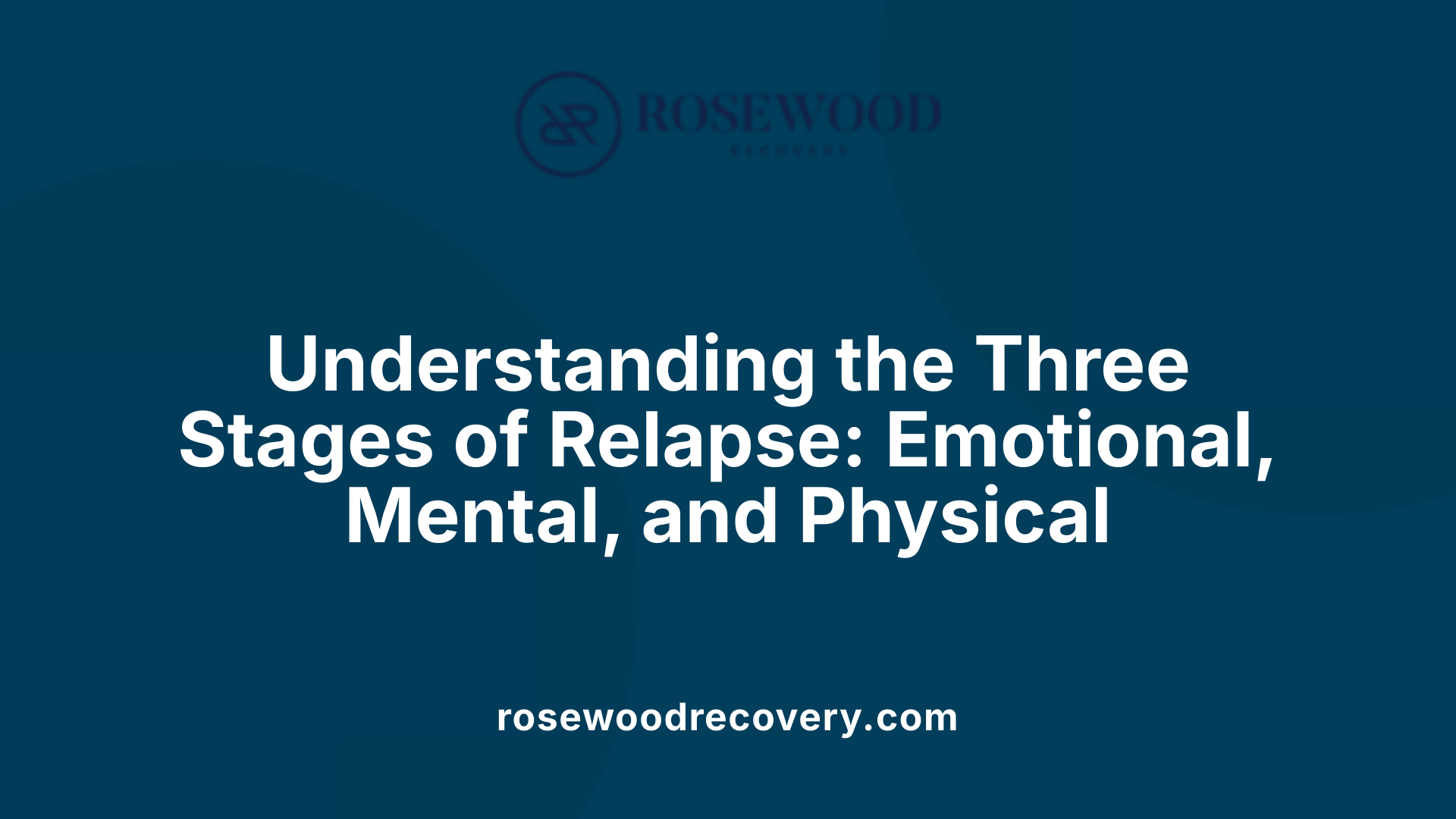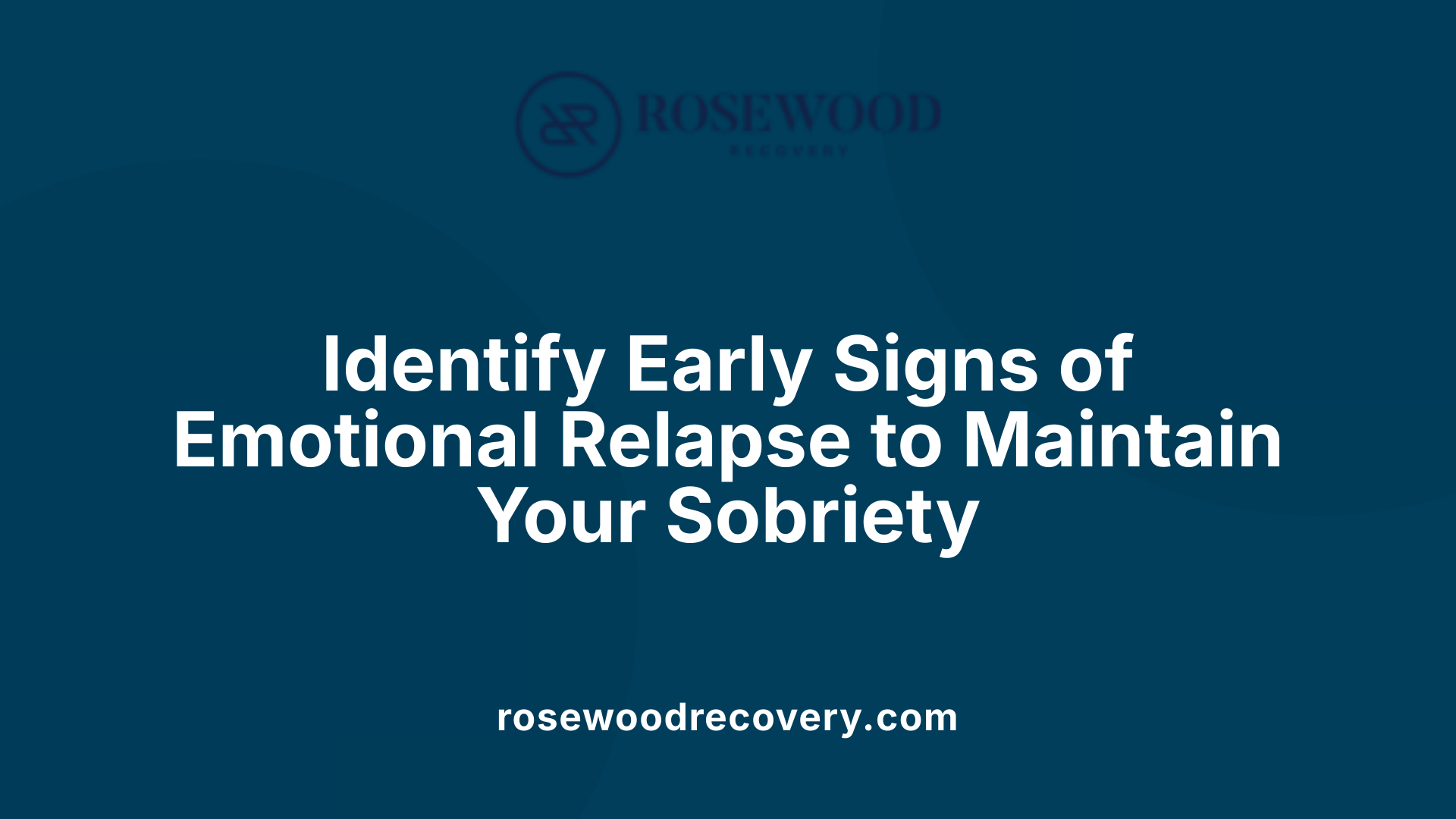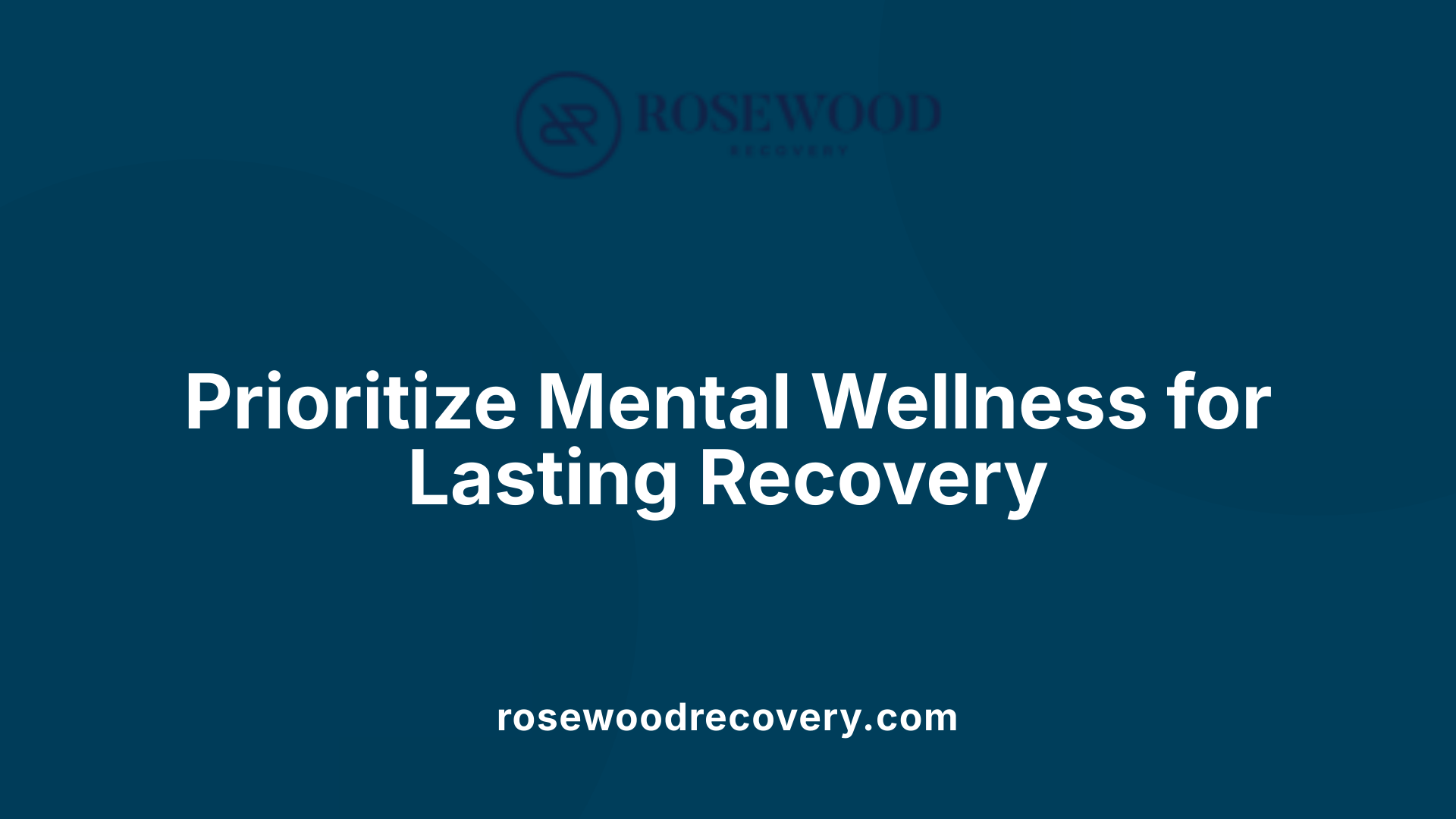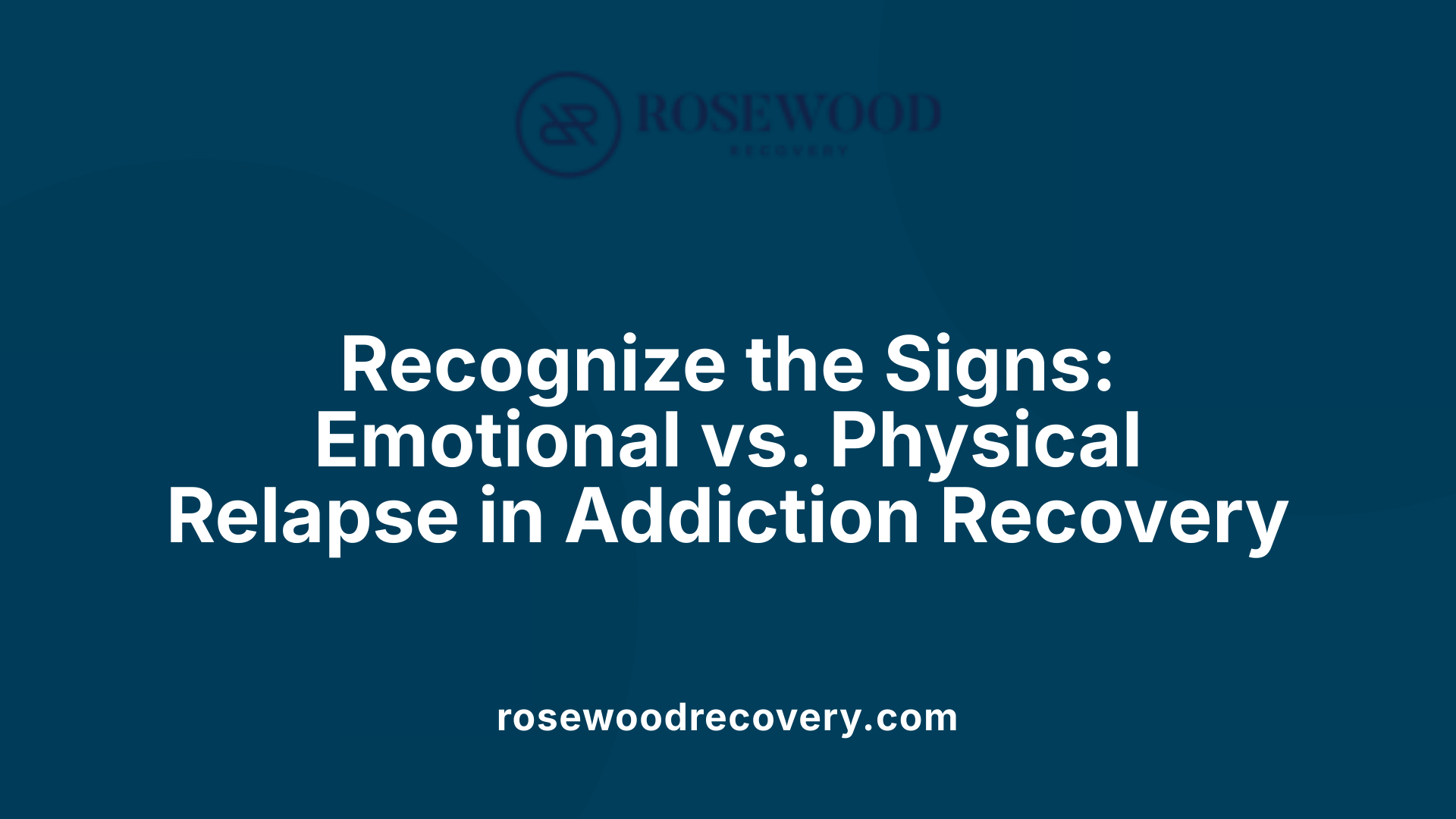Understanding Emotional Pain as a Key to Long-Term Sobriety
In the journey toward addiction recovery, recognizing and managing emotional pain is not just beneficial—it's essential. As many relapse cases demonstrate, emotional disturbances often precede physical substance use, making emotional awareness a cornerstone of effective relapse prevention strategies. This article explores how understanding emotional pain, fostering emotional intelligence, and developing resilience are vital for sustaining sobriety, ultimately transforming emotional challenges into assets for long-term recovery.
Main Concepts in Relapse Prevention

What are the main ideas in relapse prevention?
Relapse prevention highlights the importance of early recognition and intervention before substance use occurs. It views relapse as a gradual process that unfolds over weeks or months and progresses through three stages: emotional, mental, and physical.
The emotional stage is marked by poor self-care, denial, and bottled-up feelings. Signs include withdrawing from support, irritability, and neglecting personal needs. Recognizing these early signs enables timely actions to prevent escalation.
The mental stage involves obsessive thinking about substance use, and the physical stage is the actual relapse into substance consumption. Tracking this progression through self-awareness and support helps in early intervention.
Key strategies for prevention include cognitive therapy, which targets negative thought patterns like catastrophizing or all-or-nothing thinking, and mind-body relaxation techniques, like mindfulness and meditation, that reduce stress and emotional turbulence.
Developing a set of guiding principles supports sustained sobriety. Honesty with oneself and others forms the foundation of recovery. Practice of self-care—such as healthy eating, adequate sleep, and engaging in fulfilling activities—strengthens resilience against triggers.
Furthermore, adhering to the 'five rules of recovery'—change your life, be honest, ask for help, practice self-care, and don't bend the rules—provides a structured approach to maintain progress.
Recovery is a personal journey of growth that involves milestones like repairing relationships, learning coping skills, and building emotional resilience. Recognizing that relapse can be prevented through awareness and consistent effort encourages individuals to stay committed, fostering long-term stability.
The Power of Social Support in Recovery

How does social support influence relapse prevention?
Research indicates that having a strong social support system significantly impacts an individual's ability to maintain sobriety. Support networks provide emotional comfort, practical help, and shared experiences that foster resilience and accountability.
Role of emotional support networks
Emotional support from family, friends, and recovery groups helps individuals navigate the challenges of recovery. Feeling accepted and understood reduces feelings of isolation, which is a common trigger for relapse.
Impact of supportive environments on relapse risk
A positive environment with high perceived social support and low expressed emotion creates a safe space for emotional regulation. This type of environment reduces the stress and anxiety that often lead to setbacks.
Accountability and shared experiences in support groups
Support groups are vital in reinforcing commitment through shared stories and accountability. Knowing others face similar struggles helps normalize the recovery process, boosts motivation, and provides practical coping strategies.
| Aspect | Description | Additional Details |
|---|---|---|
| Emotional support | Provides reassurance and comfort during difficult times | Includes family, friends, and peer groups |
| Environment | High support, low conflict environments are protective | Reduces stress that can lead to relapse |
| Support groups | Facilitate shared experiences and accountability | Examples include 12-step programs, therapy groups |
Maintaining social connections and actively participating in support networks is proven to bolster long-term recovery efforts. It offers emotional reinforcement, reduces feelings of shame, and encourages healthier coping mechanisms.
Understanding the significance of social support in relapse prevention can guide individuals and clinicians in developing comprehensive recovery plans. It emphasizes that healing is not just an individual journey but one enriched and strengthened by supportive communities.
For further insights, exploring the search term 'social support and relapse prevention' can provide additional evidence-based strategies to enhance recovery outcomes.
The Significance of Emotional Health and Awareness
Why are emotional health and emotional awareness important in recovery?
In the journey of overcoming addiction, emotional health and awareness serve as fundamental pillars that support long-term sobriety. Understanding and processing feelings help individuals manage their emotional landscape, reducing the chances of becoming overwhelmed or succumbing to negative emotions.
When individuals are aware of their internal emotional states, they can recognize early warning signs such as irritability, anxiety, or withdrawal. This early recognition allows for timely intervention—whether through self-care, support networks, or professional help—before emotions escalate into triggers that could lead to relapse.
Developing emotional intelligence also enhances decision-making. When people understand their feelings, they can choose healthier responses instead of reacting impulsively. Techniques like mindfulness, meditation, and therapy bolster this awareness, enabling better stress management and emotional regulation.
Moreover, a strong grasp of emotional health promotes resilience. It provides a buffer against the psychological challenges of recovery by fostering self-control and positivity. This resilience helps individuals navigate setbacks and emotional setbacks more effectively, contributing to sustained sobriety.
Ultimately, nurturing emotional awareness is vital because it nurtures mental clarity. Staying connected to one’s feelings and responding thoughtfully helps break the cycle of destructive behaviors. It promotes a stable, balanced internal environment where recovery can flourish, grounded in healthier emotional responses and improved overall well-being.
Recognizing and Preventing Emotional Relapse

What are signs and strategies for emotional relapse?
Emotional relapse is an early warning stage where underlying feelings and behaviors begin to threaten long-term recovery. Recognizing its signs is crucial for timely intervention. Common emotional warning signs include feelings of irritability, anxiety, mood swings, feelings of sadness or depression, social withdrawal, irritability, and neglect of self-care routines such as healthy eating and regular sleep. Behavioral clues might be withdrawing from social support, avoiding recovery meetings, or ignoring emotional and physical needs.
Unaddressed stress, loneliness, negative thought patterns, or unresolved emotional issues such as guilt, shame, or anger can trigger emotional relapse. If these signs are overlooked, they may escalate, leading to mental or physical relapse.
To prevent emotional relapse, several effective strategies are recommended. Practicing self-awareness helps individuals catch early signs of emotional distress. Engaging in self-care activities like regular exercise, healthy eating, and relaxation techniques such as deep breathing, meditation, or mindfulness can help reduce emotional tension.
Sharing feelings openly with trusted friends, family, or support groups fosters emotional connection and validation. It’s also helpful to acknowledge emotions without self-judgment, allowing for healthier processing. Recognizing and addressing triggers early, including stress and unresolved emotional conflicts, supports maintaining emotional stability.
By implementing these strategies, individuals can effectively manage emotional challenges that threaten sobriety. Early recognition combined with proactive coping creates a buffer against progression to more severe relapse stages, paving the way for sustained recovery.
The Critical Role of Emotional Regulation in Preventing Relapse
How does emotional regulation affect relapse prevention?
Emotional regulation is fundamental in supporting sustained recovery from addiction. It involves the ability to understand, manage, and respond to emotional experiences in a healthy way. For individuals in recovery, effective emotional regulation can significantly reduce the chances of relapse.
When emotional regulation skills are well-developed, individuals can better handle negative emotions such as anger, sadness, guilt, or anxiety—which are often triggers for relapse. Instead of turning to substances to escape or numb these feelings, they learn techniques to process emotions constructively. This is especially important because many relapse episodes begin long before physical use, with emotional relapse characterized by neglect of self-care, denial, and emotional withdrawal.
Strategies like mindfulness, cognitive reappraisal, and acceptance help in reshaping how emotions are perceived and managed. Mindfulness, for example, encourages individuals to pay nonjudgmental attention to body signals and emotional states, increasing awareness and reducing impulsivity. Cognitive reappraisal involves reframing negative thoughts, which diminishes stress and emotional reactivity. These techniques help reduce habitual rumination and mood swings that can escalate into cravings.
Improving emotional regulation directly impacts cravings and impulsivity, making it easier to resist urges. Research indicates that therapies such as Mindfulness-Based Relapse Prevention (MBRP) are effective in lowering cravings and improving emotional stability. They teach individuals to recognize early signs of emotional overwhelm and employ calming strategies instead of reacting impulsively.
In summary, strengthening emotional regulation skills enhances self-awareness and resilience. This helps individuals navigate high-risk situations more effectively, preventing emotional triggers from turning into physical relapse. Ultimately, developing these skills supports a resilient mindset that sustains long-term recovery.
Supporting Mental Health for Long-term Sobriety

How do mental health treatments support addiction recovery?
Addressing the intertwined nature of mental health and addiction is vital in fostering long-term sobriety. Effective treatments help individuals confront and manage underlying issues such as trauma, depression, and anxiety, which often fuel substance use. Therapies like cognitive-behavioral therapy (CBT) and dialectical behavior therapy (DBT) are central to this process, as they equip individuals with skills to regulate emotions, challenge negative thought patterns, and develop healthier coping mechanisms.
In addition to talk therapies, creative arts, mindfulness practices, and experiential therapies promote emotional stabilization and self-awareness. Psychoeducation enhances understanding of how addiction affects the mind and body, reducing stigma and empowering clients to participate actively in their recovery journey. Integrating holistic practices such as yoga and meditation can further improve mental resilience.
Ongoing mental health support, including regular therapy sessions and community-based programs, is essential. These help individuals maintain mental wellness, manage stress, and identify early warning signs of relapse. Ultimately, a comprehensive, personalized approach that combines evidence-based therapies with lifestyle adjustments creates a robust foundation for sustaining sobriety.
More about mental health treatments in addiction recovery
Exploring the full scope of mental health interventions reveals their significance in recovery. From medication management for conditions like depression and PTSD to alternative therapies like acupuncture and creative arts, various strategies work synergistically to reduce emotional distress.
Continued care, including relapse prevention planning and support groups, helps reinforce skills learned during active treatment. Recognizing that mental health and addiction recovery are ongoing processes encourages individuals to seek help when needed and remain committed to their well-being.
By prioritizing mental health, recovery programs enhance resilience, reduce the risk of relapse, and foster a healthier, balanced life beyond addiction.
Understanding the Difference Between Emotional and Physical Relapse

What is the difference between emotional and physical relapse?
In addiction recovery, understanding the stages leading to relapse is vital for maintaining long-term sobriety. Emotional relapse is considered the earliest warning sign of relapse. It involves internal emotional and mental changes that can undermine recovery if left unrecognized.
During emotional relapse, individuals often neglect self-care, bottle up feelings, isolate themselves, and experience mood swings like irritability or anxiety. These emotional shifts are subtle but significant, signaling that recovery is at risk. At this stage, the person might deny or ignore these warning signs, emphasizing the need for awareness and intervention.
Following emotional relapse, mental relapse usually develops. This stage is characterized by cravings, intrusive thoughts about substance use, rationalizations, and minimization of the consequences. The individual may fluctuate between wanting to stay sober and considering relapse, often justifying or planning their next use.
Physical relapse is the final stage, involving actual substance use, such as taking a drink or using drugs again. This act results directly from unaddressed emotional and mental stages. By the time physical relapse occurs, the person might have already experienced significant internal struggles.
The progression from emotional to physical relapse highlights the importance of early recognition. Addressing emotional and mental warning signs early can prevent full-blown substance use. Monitoring feelings, seeking support, and utilizing coping strategies during emotional relapse are crucial steps in relapse prevention.
Why early intervention is crucial
Intervening early during emotional relapse can save the recovery process. Recognizing signs like social withdrawal, neglect of self-care, irritability, or obsession with negative thoughts allows individuals and support networks to implement strategies such as therapy, self-care routines, or support group engagement.
Creating a relapse prevention plan that emphasizes emotional resilience and coping skills helps manage these early signals. Maintaining a strong support system and practicing mindfulness can also diminish the likelihood of progressing to physical relapse.
In essence, understanding the nuances between emotional, mental, and physical relapse emphasizes that recovery is a continuous process. Being vigilant about emotional health and addressing warning signs promptly can significantly improve the chances of sustained sobriety.
Embracing Emotional Awareness for Lasting Recovery
Throughout the addiction recovery journey, understanding and managing emotional pain is the keystone to preventing relapse. Recognizing early emotional signs, developing emotional intelligence, and fostering resilience empower individuals to navigate challenging feelings effectively. Supportive environments, professional guidance, and ongoing self-awareness not only mitigate immediate risks but also build the foundation for enduring sobriety. Emphasizing emotional health transforms recovery from merely avoiding substances to cultivating a enriched, balanced life—proof that knowing oneself deeply is the most potent tool against relapse. Embracing emotional awareness is, therefore, not just beneficial but vital for anyone committed to long-term recovery.
References
- Relapse Prevention and the Five Rules of Recovery - PMC
- Understanding Emotional Factors in Recovery - Child Focus
- Why Do People Relapse? 8 Common Reasons
- Interoceptive Awareness is Important for Relapse Prevention
- Self-Awareness & Emotional Resilience Reduce Risk of Relapse
- Emotional Awareness | Addiction Treatment Programs | Recovery
- Why Is Emotional Intelligence Important in Recovery?
- Understanding Emotional Relapse Signs, Triggers, and Meaning |
- Gender-Specific Relapse Prevention Plan - Pyramid Healthcare
- The Importance of Coping Skills for Relapse Prevention




